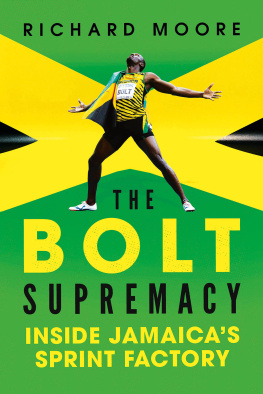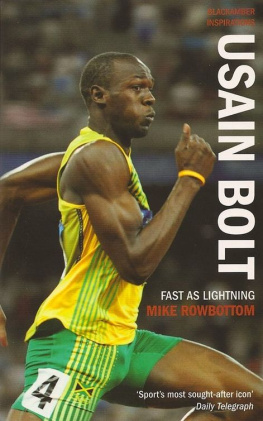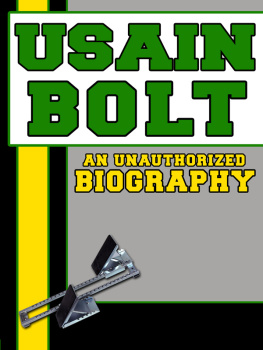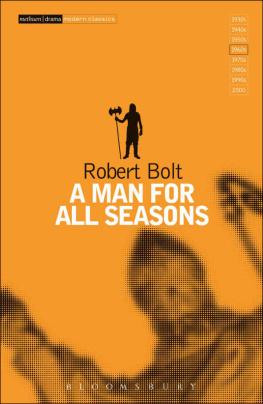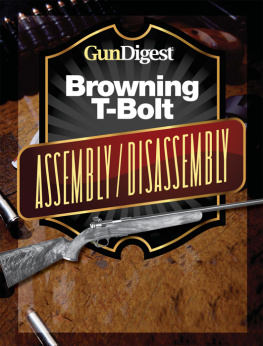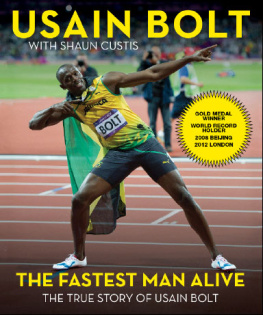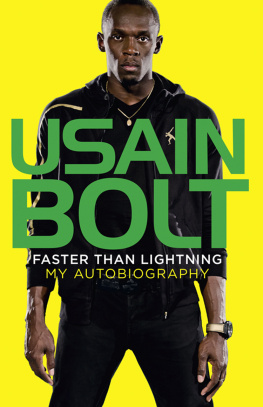
THE
BOLT
SUPREMACY
INSIDE JAMAICAS
SPRINT FACTORY
RICHARD MOORE

THE BOLT SUPREMACY
Pegasus Books Ltd.
148 W. 37th Street, 13th Floor
New York, NY 10018
Copyright 2017 by Richard Moore
First Pegasus Books cloth edition May 2017
Interior design by Maria Fernandez
All rights reserved. No part of this book may be reproduced in whole or in part without written permission from the publisher, except by reviewers who may quote brief excerpts in connection with a review in a newspaper, magazine, or electronic publication; nor may any part of this book be reproduced, stored in a retrieval system, or transmitted in any form or by any means electronic, mechanical, photocopying, recording, or other, without written permission from the publisher.
Library of Congress Cataloging-in-Publication Data is available.
ISBN: 978-1-68177-407-7
ISBN: 978-1-68177-469-5 (e-book)
Distributed by W. W. Norton & Company
For Virginie
In Jamaica little is done without a touch of embellishment or some panache. Jamaicans walk with style, drive cars with style, and play with style. It is not so much scoring a, goal or hitting a boundary that is important, but the way that it is done. People leaving church will admit openly that they did not understand what the preacher said, but he sound good.
Mervyn C. Alleyne, Roots of Jamaican Culture

LIST OF ILLUSTRATIONS
| Page |
| Mens 100m final, London Olympics 2012 (Getty Images) |
| Bolt with lightning at the 2013 IAAF World Championships, Moscow (Getty Images) |
| UTech Classic, 2014 (Robin Moore) |
| Usain Bolts first running track 58 UTech Classic, 2014 (Robin Moore) |
| Javon Francis, UTech Classic, 2014 (Robin Moore) |
| Dennis Johnson, 2014 (Robin Moore) |
| Statue of Herb McKenley, Jamaica (Robin Moore) |
| Stephen Francis with Asafa Powell (Getty Images) |
| Usain Bolt practises starting while coach Glen Mills watches on (Rex Features) |
| Dr Hans-Wilhelm Mller-Wohlfahrt (Offside) |
| Shelly-Ann Fraser-Pryce in front of her family home, 2008 (Getty Images) |
| Usain Bolt winning the mens 100m Olympic final, Beijing, 2008 (Getty Images) |
| Yohan Blake, 2014 (Getty Images) |
| Victor Conte (PA Images) |
| Paul Wright, 2014 (Robin Moore) |
| UTech Classic, 2014 (Robin Moore) |
| Usain Bolt is disqualified from mens 100m final for a false start at the 2011 IAAF World Championship, Daegu (Rex Features) |
| Shelly-Ann Fraser-Pryce with her mother in front of her family home, 2008 (Getty Images) |
| UTech Classic, 2014 (Robin Moore) |
| Zharnel Hughes, 2014 (Robin Moore) |
CONTENTS
INTRODUCTION
London, November 2016
On a dark and bitterly cold evening in late November 2016 large black boards surround Leicester Square in London. The only colour is a red-carpeted corridor leading to the entrance of the Odean Cinema. Security staff throng the area and, in a tightly controlled public pen, a small crowd presses against the barriers. When he steps out of an SUV and on to the red carpet, theres a cheer for Usain Bolt. Then a louder one for Liam Payne of boys band One Direction.
The fastest man in history, in smart suit and polished shoes, makes his way slowly along the carpet, stopping for interviews and blowing on his hands to try and stop them from freezing. By the time he reaches the entrance to the cinema theres a rattling in his skullhes shivering. But inside, theres a warm welcome from friends including Mo Farah, the British distance runner, Linford Christie, the 1992 Olympic 100m champion, and Bolts fellow Jamaican, the DJ Sean Paul. We need our mood lifted sometimes and Usain does that, Paul said on his way in. Hes a national hero, a leader.
Bolt greets them all but reserves his most effusive welcome for a diffident figure with dark eyes and greying, shoulder-length hair. This is Hans-Wilhelm Mller-Wohlfahrt and he looks about as comfortable on the red carpet as Bolt would be in an operating theatre. Healing Hans, as Mller-Wohlfahrt is sometimes known, is Bolts Munich-based doctor. A not uncontroversial figure, he has worked with many world class athletesincluding Christie, who hugs him but in a career that has spanned five decades he has never had a bond with an athlete as strong as the one he has forged with Bolt.
In I Am Bolt, the documentary film we are in London to see, Mller-Wohlfahrt makes a couple of appearances, coming to the rescue in the build-up to the Rio Olympics, Bolts swansong on this stage, when it seemed that the sprinters body was broken beyond repair. He was injured in an incident in a nightclub in Kingston, the Jamaican capital, in January, eight months before the Games. I was stepping over a barrier, I stepped on the edge of the ledge and rolled my ankle, Bolt said. Next day, the ankle was badly swollen. There were three weeks off training, then another three. He doesnt sound worried, said his laconic coach, Glen Mills. That doesnt necessarily mean hes not.
At the London premiere Bolt was joined by most of the people who have been with him on his 15-year journey. It remained a small, tightly-knit group, as though Bolt was a cottage industry rather than a global brand. As well as Mller-Wohlfahrt there was the school friend who is now his manager, Nugent NJ Walker, his parents, Wellesley and Jennifer, and his agent, Ricky Simms. The only significant absentee was the reclusive Mills.
The film showed how close Bolt came to not making it to Rio, or not making it there in the shape he needed to be in to win. The injury was only part of it. The mental struggle was tougher. Bolt suffered from a lack of motivation. He wondered what the point was. Its not as fun as it used to be, admitted. The older I get the less fun it is. More sacrifices, less partying, less drinking. I hate doing something that I dont really enjoy. He wanted, he said, to be a human again. There was footage of Bolt in Beijing at the 2008 Olympics and the contrast was striking. Back then he was an overgrown, excitable child, permanently smiling. Like his hairline (Bad genes, he tells his father, that I got from you), his smile had receded in the intervening eight years. Its hard to be as hungry as a person who has never won a championship, a gold medal, he reflected. With surprising candour, he hinted that money had been his original motivation: [When] I started out, I wanted to clear mum and dads debts, then it was to buy nice stuff, cars and clothes, then it was to secure my future. Now Ive done that stuff I just want to give up. Its hard at this stage. I find motivation difficult. All that was left was to repeatto try and win a third Olympic triple of 100m, 200m and 4x100m. At a certain point, said Michael Johnson, the battle isnt with your rivals, its with yourself. Its a lonely place.
Then, on 12 February 2016, Bolts motivation returned, and with a vengeance. His great rival, Justin Gatlin, gave an interview to TMZ Sports. Gatlin, who has famously served two doping bans, ran Bolt close in 2015. At 33, he seemed to be getting quicker. On TMZ, Gatlin looked ahead to Rio. Im going to win, he said, then were going to go on a tour of the USA, a tour all around the country with [the Olympic gold medal] on a chain.
Next page
